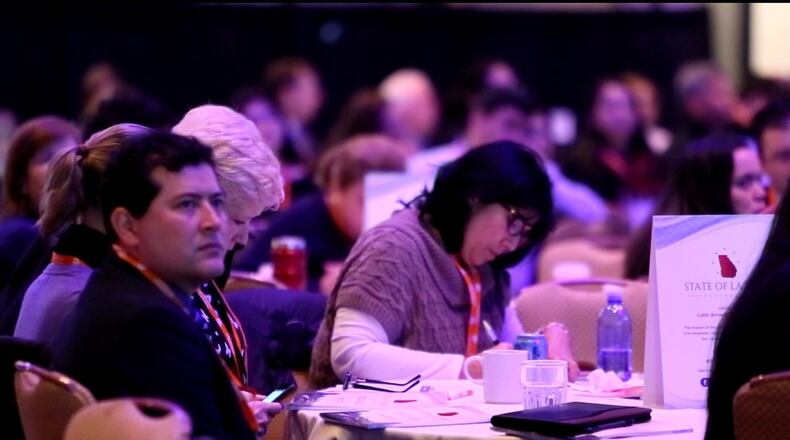Politicians, leaders, activists, and members of diverse organizations convened recently for ‘State of Latinos 2018,’ a summit held by the Latin American Association which puts a spotlight on the increase of the Hispanic population in Georgia and its impact on the state’s economy, among other themes.
The event opened with a presentation by United States Secretary of Labor, Alexander Acosta, who emphasized the need for an educational system that places a focus on economy and business. “We spend billions on education, but we don’t ask ourselves what the necessary skills are out there. We must reinvest in human capital, in an education that leads students to good jobs,” he said.
Acosta also pointed out that Hispanic women “are the fastest growing demographic group of entrepreneurs in the United States.”
For his part, Michael Carnathan, manager of the Research & Analytics Division at the Atlanta Regional Commission , presented a demographic map of Latinos throughout the state. It showed the number of Hispanics in Georgia has doubled since 2000, which puts the state among the top 10 in terms of Latino population.
The impact Latinos have had on the state’s economy was also a key discussion point.
“Hispanics have a buying power of $1.5 trillion in the United States. The number of Latino-owned businesses has increased to 46 percent from 2007 to 2012,” added Eloisa Klementich, president and CEO of Invest Atlanta, the economic development authority for the city of Atlanta.
The mayors of Brookhaven, Norcross, and Decatur formed part of another discussion panel about their efforts to make their cities more hospitable and inclusive for immigrant communities.
“There is fear in our community, and it is real. It’s an unresolved conversation, but it’s important that we have it. There is a lot of crime that occurs in our community that goes unreported because of the fear in the community, that they could be deported. What we’ve done is hire more Hispanic police officers and we’ve created the Citizens Police Academy, so that members of the community better understand the laws. Our focus in Norcross is to educate, not incarcerate,” said Norcross Mayor Craig Newton.
The highlight of the event was keynote speaker Janet Murguía, president of UnidosUS, a Hispanic civil rights and advocacy organization. It was formerly known as the National Council of La Raza.
“We talk about the power of our Latino community in this country. We have advanced so much, and we have more power than ever, but we’re going to need it, because we are facing many challenges right now, among our families and our community,” said Murguía, in a separate interview with MundoHispánico. “We must change the narrative that we see, which contrasts with the reality of what we do as a community and how we contribute. It’s more important that we speak about our stories, about work, about what we have contributed as individuals, family by family, community by community.”
Murguía emphasized the importance of delivering a clear message to politicians both at the state and federal level.
“Our message must be very simple: to tackle bills that will damage our community and the state of Georgia. We must use our voice and our vote. All of us who are eligible must go and vote, not just in national elections but at the local level,” explained Murguía.
For Santiago Marquez, President of the Georgia Hispanic Chamber of Commerce, attending the conference was imperative.
“We are all here together to see how we can help the community so that it can continue with its education, with finding employment…. with DACA and the ‘Dreamers,’ we must take a position. Legislators must do something so that those dreamers can stay. They are Americans, and we will always take that position,” said Marquez.
At least 560 individuals attended the first-time event, held by the LAA.
“When you see how the Latino community is growing, how we are nearing 10 percent of the population, we know that there is a need to call on leaders of the political and business sectors and non-profit organizations. How do we start these conversations? What is the importance of the contributions and challenges of the Latino community? If we don’t see that, we could lose the perspective of the future that is so important here in Georgia. We are growing, and we are going to be here. This is our state,” said Anibal Torres, executive director of the LAA.
About the Author
The Latest
Featured


